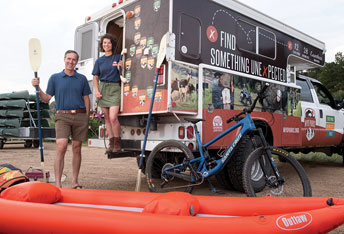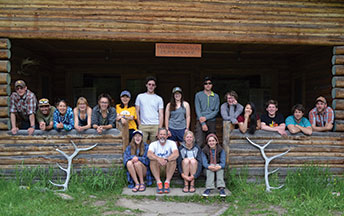
Contact Us
Institutional Communications
Bureau of Mines Building, Room 137
Laramie, WY 82071
Phone: (307) 766-2929
Email: cbaldwin@uwyo.edu
Real-World Solutions
September 10, 2021

Outdoor Recreation and Tourism Management Degree Coordinator Dan McCoy at North Crow
Reservoir with recent graduate Brynn Hirschman, who is an outdoor recreation coordinator
for the Wyoming Office of Outdoor Recreation in Cheyenne.
Haub School of Environment and Natural Resources students learn hands on, helping to solve problems throughout the state.
By Micaela Myers
Haub School of Environment and Natural Resources students from a variety of majors and minors work throughout the state, helping communities find real-world solutions to complex environmental and natural resource challenges. Wyoming’s unparalleled natural richness makes for a perfect classroom. The school offers interdisciplinary and experiential courses and majors and minors. Here, we highlight one such major and a course that exemplify the school’s approach.
Outdoor Recreation and Tourism Management
In Wyoming, tourism is the second-largest industry from an economic and employment perspective, prompting UW to launch its Outdoor Recreation and Tourism Management Program in 2018—a partnership between the Haub School and the College of Business. Already, its graduates are finding jobs in the industry around the state.
The program is hands-on and interdisciplinary, with five concentrations for the Bachelor of Science degree: business and hospitality management, management of recreation resources, cultural and international tourism, outdoor recreation leadership, and the customizable option of creative studies in recreation and tourism. These are all aimed to train students for careers in the private sector or public service. The program offers students in-depth study of business fundamentals, recreation and tourism, environment and natural resources, and people and culture.
Real-world experiences include practical instruction, internships, capstone projects and a professional semester in which they complete a team-based project for an organization or business. These real-world experiences emphasize doing over simply knowing. The program was created to cover the breadth of the industry and to graduate a well-rounded and flexible workforce.
“Tourism in Wyoming is closely tied to outdoor recreation,” says Degree Coordinator Dan McCoy. “You need cultural and natural resources on one side of the equation and business services like places to stay and eat on the other. In the middle is where this degree comes together—the intersection of resources and services.”
Dana Even of Lindenhurst, Ill., graduated May 2021 with a concentration in business and hospitality management and is now the business services senior coordinator for the Wyoming Office of Tourism.
“I love that my job supports the tourism industry as a whole throughout the state of Wyoming,” she says. “My degree was incredibly helpful to prepare me for my job. Learning about Wyoming businesses who benefit from visitors helped me understand what
the tourism industry is and how it affects real people. Tourism is a very personal industry where we want to see people have a good time and make memories in hopes they will come back again.”
Even completed her internship at Little America in Cheyenne in its food and beverage department, which she describes as the key to unlocking her love for tourism and hospitality. “Being able to speak to people from all over the world about why they come to Wyoming was my favorite part,” Even says. “The internship made me realize that the tourism industry encompasses all different types of businesses.”
McCoy says that the internships and capstone semester were the result of listening sessions around the state to develop the degree. “Employers were telling us to please not send students out without hands-on experience,” he says. “That’s how we decided to move forward with this innovative experience.”
In addition to the 400-hour internship, senior year includes a professional semester. Each year, the seniors focus on a different area of the state, starting with Lander the first year and southeast Wyoming this past year.
“It’s a project- team-based senior year capstone experience,” McCoy says. “They work in teams to develop products, research or work on an issue in the community. It’s something that’s relevant, timely and needed by that community.”
For example, this year students helped Snowy Range Ski Area evaluate its mountain sports program; helped Visit Laramie develop its Recreate Responsibly campaign; worked with Visit Cheyenne on its tourism master plan; put in time with the city of Laramie’s bike park feasibility study; and helped the Wyoming Office of Outdoor Recreation develop communications to inform legislators and policy makers on the importance of outdoor recreation in the state.
“The capstone semester was great,” says Brynn Hirschman of Aurora, Ohio, who graduated May 2020 with a concentration in management of natural resources and now works as an outdoor recreation coordinator for the Wyoming Office of Outdoor Recreation in Cheyenne. “My capstone project was with a group of five students. We completed a toolkit for Wyoming State Parks that is utilized by those seeking to add an outdoor recreation collaborative. It covers how to get a group of people together and create a common goal, create projects, work together and find funding.”
Hirschman says the project helped her land her current job and make connections around the state. For her internship, she worked at a guest ranch. Students are able to choose their internships based on interests. She appreciates that the degree left her ready to successfully enter the workforce.
“This degree was a perfect fit for what I was looking for in the outdoor world,” says Hirschman, who is now enrolled in UW’s new outdoor guide certification program. “Not many other colleges are offering it. Students interested in the outdoors should definitely look into this program.”

Students in the inaugural 2017 Environmental Solutions field course with course creator
Doug Wachob (front row, second from left). Courtesy photo
Environmental Solutions Field Course
In Jackson, Wyo., trout populations are on the decline due to increased algae. An unlikely culprit: lawn care practices. A team of UW students from a variety of majors explored this challenge via the Haub School Environmental Solutions field course. After a spring semester preparation course, they spent four weeks in summer 2019 living at the historic Murie Ranch in Grand Teton National Park and working with a variety of community partners to build informed collaborative solutions to real-world environmental and sustainability challenges.
For this particular project, students supported Jackson Hole’s Clean Water Coalition Trout Friendly Lawns Program, which aims to reduce nitrogen runoff by improving local lawn care practices. They developed a three-part strategy that included a presence at community events, an increased social media presence and stakeholder interviews to identify allies, such as lawn care businesses willing to offer trout-friendly approaches. Other student teams in the 2019 course created a food waste collection toolkit to support composting in local organizations; an inventory of potential individual, organizational and policy-level actions for energy conservation and emissions reduction; and a waste tracking tool for Jackson Hole Airport.
“Students learn in a real-world setting using complex social-ecological challenges in Jackson Hole and the greater Yellowstone ecosystem as a context,” says Assistant Professor Rachael Budowle, who teaches the course. “They work on defined projects—which faculty mentors scope with Jackson Hole stakeholders prior to the course—to address authentic and engaging issues of relevance to their community-based project mentors.”
Offered since 2017, the course is open to all UW students with junior, senior or graduate student standing. They bring skills from a range of fields in addition to environment and natural resources—such as history, philosophy, business, economics, wildlife biology, journalism, engineering, law and rangeland management—and apply them to actual on-the-ground challenges. Area partners have included Energy Conservation Works, Teton Conservation District and Vertical Harvest.
“The course allows us to engage in projects that community partners identify as relevant,” Budowle says. “In addition to faculty mentors, these community partners mentor students throughout the entire project—from creating implementation plans to interviewing stakeholders and site visits to achieving final deliverables. Projects provide an opportunity for student learning and achieve tangible meaningful outcomes for community partners. Students have described this course as transformative, allowing them to develop teamwork and collaboration capacities and project management and professional skills and to support actionable and meaningful change. Environmental Solutions embodies UW’s interdisciplinary and entrepreneurial pillars.”
Currently, the course is offered every year, including a virtual version of the course during the pandemic. This summer, Budowle also piloted paid student fellowships with longtime community partner Teton County Integrated Solid Waste and Recycling. Fellowships allow experienced Environmental Solutions students to complete additional high-quality projects and to meet community needs beyond the course itself.
“We hope to further develop a fellowship approach that can pair students with organizations and partners not only in Jackson Hole but throughout Wyoming to address our state’s most pressing social and environmental challenges,” she says.
Watch short videos about student projects at bit.ly/environmental-solutions and view a project gallery at bit.ly/environmental-gallery.
Contact Us
Institutional Communications
Bureau of Mines Building, Room 137
Laramie, WY 82071
Phone: (307) 766-2929
Email: cbaldwin@uwyo.edu


